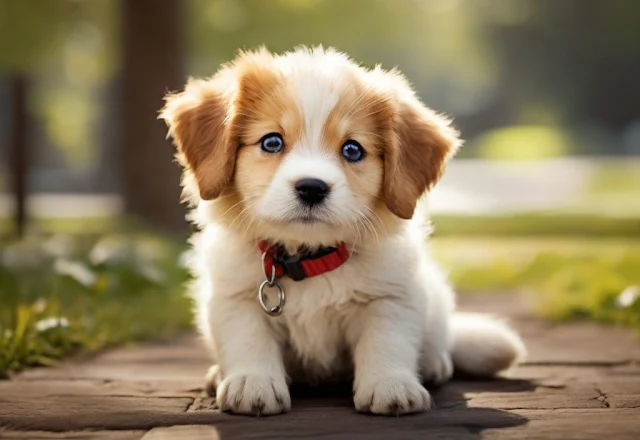When it comes to puppy training, the paradigm of positive reinforcement stands out as a beacon of effectiveness. This methodology revolves around rewarding desired behaviors, creating an environment where the puppy associates good conduct with positive outcomes. Let's delve into the intricacies of this approach, unlocking the secrets that make it a powerful tool in shaping a well-behaved and responsive canine companion.
1.Building the Foundation: Positive Reinforcement 101
- Treats for Triumphs: Every desired behavior, from a calm "sit" to a joyful "come," deserves a celebration! Keep a pouch of your pup's favorite treats handy to instantly reward successes, creating a positive association with following your commands.
- Clicker Cues: Consider incorporating a clicker, a small device that emits a distinct sound, into your training. Click the moment your pup exhibits the desired behavior, followed by a treat, to pinpoint exactly what you're rewarding. This precise timing strengthens the connection between action and reward.
- Patience is Pawsome: Remember, learning takes time, and setbacks are inevitable. Embrace patience and avoid reprimands, which can lead to confusion and anxiety. Keep training sessions short and engaging, ending on a positive note to leave your pup eager for more.
2.Establishing the Foundations: Consistency and Patience
Consistency is the bedrock of any successful puppy training program. From basic commands to complex behaviors, the puppy needs a consistent environment to understand and internalize expectations. Coupled with consistency, patience plays a pivotal role. Puppies are in a constant state of learning, and patience is the bridge that connects the desired behavior with the learning process.
3.Positive Reinforcement in Action
In the realm of positive reinforcement, the emphasis is on rewarding behaviors you want to see more of. This can be as simple as offering a treat when the puppy responds correctly to a command or providing praise during playtime. The key is to make the reward immediate and relevant to the behavior, creating a clear connection between action and consequence in the puppy's mind.
Tailoring Training to Individual Puppies
Recognizing Diversity in Canine Personalities
Not all puppies are created equal, and understanding the unique traits of individual canines is crucial in tailoring puppy training effectively. Some may be naturally more energetic, while others might be more reserved. The approach to training should align with the puppy's personality, creating an environment where they can thrive.
Advanced Techniques for Specialized Training
As your puppy progresses in their training journey, advanced techniques can be introduced for more specialized skills. This could involve off-leash training, agility exercises, or even advanced commands. The goal is to challenge the puppy's mental and physical abilities, promoting a well-rounded and responsive companion.
Overcoming Challenges in Puppy Training
1.Navigating Common Hurdles: Potty Training and Chewing
While positive reinforcement is a potent tool, common challenges like potty training and inappropriate chewing require targeted approaches. Consistent schedules for bathroom breaks, along with redirecting chewing behaviors to appropriate toys, are essential strategies in overcoming these hurdles.
2.Harnessing the Power of Play: Mental Stimulation
Playtime is not just about physical exercise; it's a crucial component of mental stimulation. Engaging in interactive games not only strengthens the bond between owner and puppy but also provides an outlet for mental energy, reducing the likelihood of behavioral issues.
-Holistic Puppy Care: Balancing Physical and Mental Well-Being
Explore strategies for a well-rounded approach to puppy care, addressing not only physical exercise but also mental stimulation. A holistic perspective ensures a happy, healthy, and well-behaved companion.
-Socialization Strategies: Nurturing a Confident and Adaptable Canine
Socialization is a critical aspect of a puppy's development. Uncover effective strategies for exposing your puppy to various environments, people, and animals, fostering confidence and adaptability.
-Mastering Recall: Building a Foundation for Reliable Commands
Recall is a fundamental command for a well-trained puppy. Delve into techniques that ensure your puppy responds reliably to recall, reinforcing the bond between you and your companion while ensuring safety in various situations.
-Nutritional Essentials: Fueling Your Puppy's Growth and Development
Nutrition plays a crucial role in your puppy's overall well-being. Explore the foundations of a balanced diet, considering age, breed, and specific nutritional needs to support optimal growth and development.
-Advanced Training Tips: Elevating Your Puppy's Skills Beyond Basics
Explore advanced training techniques that go beyond the fundamentals. From advanced tricks to off-leash reliability, these tips contribute to a well-behaved and highly trained canine companion.
In summary, effective puppy training is an art that involves understanding, patience, and the strategic application of positive reinforcement. As you embark on this journey with your furry friend, keep in mind the individuality of each puppy and tailor your approach accordingly. Whether addressing common challenges or exploring advanced techniques, the goal is to nurture a responsive, well-behaved, and happy canine companion.


